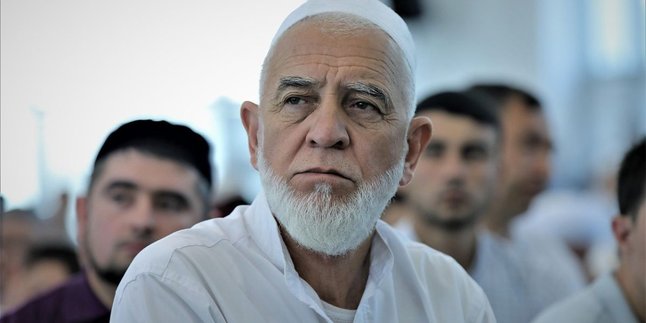Kapanlagi.com - Each day in the holy month of Ramadan holds unique virtues, and the 14th day is no exception. This day is considered special because the promised rewards are so abundant. Many Muslims are curious about what exactly makes fasting on this day special and how the worship performed can bring great rewards in the sight of Allah SWT.
According to various Islamic sources, fasting on the 14th day of Ramadan is believed to provide rewards equivalent to worshiping alongside the Prophets for a hundred years! This virtue serves as an encouragement for Muslims to enhance the quality of their worship during this blessed month.
However, what is the evidence that underlies this virtue? And how can Muslims optimally utilize the momentum of the 14th day of Ramadan? Here is an interesting summary from Kapanlagi.com that thoroughly explores information about the 14th day of Ramadan on Friday (3/14/2025).
1. The Virtues of Fasting on the 14th Day of Ramadan
On the 14th day of Ramadan, Muslims are reminded not only to focus on fasting but also on enhancing the quality of their worship. By performing the fast sincerely, we can attain immense rewards. Here are some virtues of fasting on the 14th day:
- Reward of Worshiping with the Prophets: As mentioned, fasting on this day carries a tremendous reward, as if we were worshiping alongside the Prophets for 200 years.
- Forgiveness of Sins: The 14th day is an opportune moment to seek forgiveness from Allah SWT for all the sins committed.
- Enhancing Piety: Fasting is a means to increase our piety and closeness to Allah SWT.
- Opportunity to Increase Worship: In addition to fasting, we are also encouraged to increase our prayers, read the Qur'an, and make supplications.
These virtues highlight the importance of fasting on the 14th day of Ramadan. Although there are different interpretations in various sources, what matters most is to perform the fast with sincerity and to enhance the quality of our worship. May Allah SWT accept all our good deeds.
2. The Meaning of Spirituality Behind the Virtue of the 14th Day of Ramadan
The virtue of fasting on the 14th day of Ramadan is not only related to great rewards but also holds a deep spiritual meaning. As we enter the middle of Ramadan, Muslims become more accustomed to the practice of fasting and focus more on enhancing their spiritual quality.
At this stage, the body has adapted to the fasting conditions, thus physical challenges like hunger and thirst diminish. This becomes an opportune time to draw closer to Allah through acts of worship such as tarawih prayers, reading the Qur'an, and engaging in dhikr.
Another special aspect is that the prayers offered on the 14th day of Ramadan are believed to be more accepted. A prayer that is often recommended to be recited on this day is as follows:
"O Allah, do not punish me in this month for my mistakes. Save me in this month from all sins, and do not make me in this month a place of calamity and disaster. With Your glory, O Glory of the Muslims."
3. Evidence and Sources of the Virtue of Fasting on the 14th Day of Ramadan
The 14th day of Ramadan holds extraordinary virtues, as revealed in the classic book Durrah al-Nashihin by Sheikh Ustman bin Hasan bin Ahmad Asy Syakir Al-Khaubawiyi.
In this book, it is explained that each day in this holy month has special significance, and on the 14th day, angels descend from heaven to bear witness for those who perform the tarawih prayers and fast. Not only that, Allah SWT also promises to free them from reckoning on the Day of Judgment.
This special quality serves as a bridge to enhance piety and closeness to the Creator. Therefore, anyone who takes advantage of the momentum of Ramadan, especially in the middle of this month, will attain forgiveness for sins and blessings both in this world and in the hereafter.
4. How to Maximize Worship on the 14th Day of Ramadan
To gain the maximum benefit from the virtues of the 14th day of Ramadan, there are several things that Muslims can do, including:
Performing worship with full awareness and strong intention
A sincere and heartfelt intention in fasting is crucial to obtain the rewards promised by Allah SWT.
Performing tarawih prayers and increasing sunnah worship
As mentioned in various Islamic sources, the tarawih prayers on the night of the 14th hold great virtue and are witnessed by angels.
Increasing supplications and dhikr
Supplications made on this day are believed to have a greater chance of being accepted.
Giving charity and sharing with others
Charity during the month of Ramadan has multiplied rewards, especially for those in need.
5. FAQ
1. What is the significance of fasting on the 14th day of Ramadan?
Fasting on the 14th day of Ramadan has great significance, likened to worshiping alongside the Prophets for 200 years and providing an opportunity to attain forgiveness of sins.
2. Why is there a difference in the numbers between 100 years and 200 years in the significance of fasting?
This difference in numbers comes from various interpretations of hadiths and religious texts, but the essence of the significance remains the same, which is the great reward for those who fast.
3. What should be done besides fasting on the 14th day of Ramadan?
In addition to fasting, it is recommended to increase the Tarawih prayers, read the Qur'an, and pray to enhance the quality of worship.
4. How to seek forgiveness for sins while fasting?
While fasting, we can sincerely and earnestly seek forgiveness, as well as increase our prayers and istighfar to Allah SWT.
(kpl/rmt)
Disclaimer: This translation from Bahasa Indonesia to English has been generated by Artificial Intelligence.












